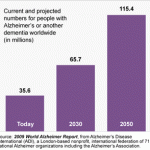2. The 4 Pillars of Brain Maintenance
Highlights from Section 2: The 4 Pillars of Brain Maintenance
- Thanks to lifelong neuroplasticity and neurogenesis, our lifestyles and actions play a meaningful role in how our brains physically change.
- There is no “general solution†to brain maintenance. A multi-pronged approach centered on nutrition, stress management, and both physical and mental exercise is recommended for better brain health.
In Section 1, you learned about brain functions and neuroplasticity. As you will discover in the present section, the idea of brain maintenance rests upon these two key concepts. Before focusing on brain training in Section 3 we would like to give you now an overall view of what one can do to maintain good brain health.
|
|
Why a brain-healthy lifestyle is so importantThe latest scientific research shows that specific lifestyles and actions can, no matter our age, improve the health and level of functioning of our brains. Such improvement can happen thanks to neuroplasticity that is, when the rate of creation and survival of new neurons in certain parts of the brain is increased, or when the rate of creation and survival of synapses (the connections between neurons) speeds up, or when a neurochemical environment is nurtured in our brains to support information processing. |
|
|
Nutrition and supplements (DHEA, Ginkgo Biloba, Omega‑3): separating myth from factThe brain consumes considerable amount of glucose. One of the earliest sign of dementia is a decrease in the ability of the brain to use glucose efficiently. As such a dysfunction is at the core of diabetes, some neuroscientists refer to Alzheimer’s Disease as Type 3 diabetes. |
|
|
Stress management: exercise, relax, socialize, empower, biofeedbackProlonged exposure to high levels of stress can damage the brain. As part of a brain-healthy life-style it is essential to manage stress efficiently. |
|
|
Physical exercise: why aerobic exercise enhances neurogenesis and neuroplasticityAs little as three hours a week of brisk walking has been shown to halt, and even reverse, the brain atrophy (shrinkage) that starts in a person’s forties, especially in the regions responsible for memory and higher cognition. Exercise increases the brain’s volume of gray matter (actual neurons) and white matter (connections between neurons). |
 |
Mental stimulation: building a Brain/ Cognitive Reserve with novelty, variety and challengeThe cognitive or brain reserve hypothesis states that it is possible to build up the brain’s resilience to neuronal damage and delay the onset of Alzheimer’s symptoms. The concept of brain reserve stems from the repeated observation that the relationship between clinical symptoms and actual brain pathology is not direct. |
|
|
Brain maintenance: cognitive enhancement first, Alzheimer’s delay secondBrain maintenance may play a role in postponing the emergence of dementia-related symptoms. A significant amount of research has been conducted on healthy aging in the past two decades. A number of factors have been associated with reduced risks of developing Alzheimer’s disease. |
|
|
Summary: how to live a brain-healthy lifestyleAs a general guideline, what is good for the body is also good for the brain. Chronic stress reduces and can even inhibit neurogenesis. Physical exercise has been shown to enhance brain physiology in animals and, more recently, in humans. Mental Stimulation strengthens the synapses or connections between neurons, thus improving neuron survival and cognitive functioning. |
Keep learning by reading more articles in the Resources section, and also please consider joining our free monthly Brain Fitness eNewsletter
This new online resource is based on the content from the book The SharpBrains Guide to Brain Fitness (May 2009, $19.95), by Alvaro Fernandez and Dr. Elkhonon Goldberg.





